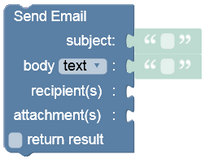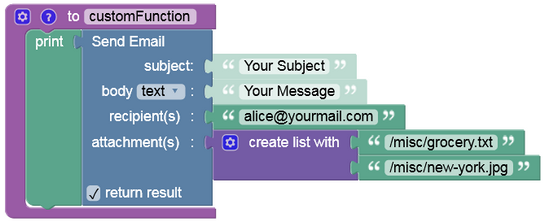Send Basic Emails API¶
Backendless provides API for basic email delivery. The API lets you specify:
- plain text and/or HTML-based content for your email messages;
- a list of email address for the recipient;
- a list of attachments;
Important
Before the API can be used, the Backendless backend must be configured with your own SMTP server information. This is an important requirement as the API will not work when the Manage > App Settings > Email Settings section in Backendless Console contains default values. For instructions on how to configure your own SMTP server in Backendless, see the Email Settings section.
Sending Email API¶
Delivers an email message to the recipient(s) specified in the API call.
Future<MessageStatus> Backendless.messaging.sendTextEmail(String subject, String messageBody, List<String> recipients)
Future<MessageStatus> Backendless.messaging.sendHTMLEmail(String subject, String messageBody, List<String> recipients)
Future<MessageStatus> Backendless.messaging.sendEmail(String subject, BodyParts bodyParts, List<String> recipients, [List<String> attachments])
where:
| Argument | Description |
|---|---|
subject |
email message subject. |
messageBody |
plain text or HTML body of the email message. |
bodyParts |
an instance of com.backendless.messaging.BodyParts class which contains either plain text and/or HTML version of the message body. |
recipients |
a collection of email addressed to deliver the email message to. |
attachments |
an array of file paths for the file entries from the Backendless File Service. Referenced files will be attached to the email message. The path is calculated from the root of the file system (as it is seen in File Service browser in Backendless console) without the leading slash. For example, if file agreement.txt is located at /documents/legal/, then the path in the API call must be "documents/legal/agreement.txt". |
Example¶
// Text message to the single recipient
Backendless.messaging.sendTextEmail("Reminder", "Hey JB! Your car will be ready by 5pm",
["james.bond@mi6.co.uk"]).then((response) {
print("Email has been sent");
});
// HTML message to multiple recipients
List<String> recipients = ["mom@gmail.com", "dad@gmail.com"];
String mailBody = "Guys, the dinner last night was <b>awesome</b>";
Backendless.messaging.sendHTMLEmail("Dinner", mailBody, recipients).then((response) {
print("Email has been sent");
});
Example - With The attachments Parameter¶
String subject = 'subject of email';
BodyParts parts = BodyParts('text message', 'html message');
List<String> recipients = <String>['joe@yahoo.com', 'bob@gmail.com'];
List<String> attachments = <String>['path/to/first/file.txt', 'path/to/second/file.txt'];
await Backendless.messaging.sendEmail(subject, parts, recipients, attachments);
Codeless Reference¶

where:
| Argument | Description |
|---|---|
subject |
Email message subject. |
body text/html |
Plain text or HTML body of the email message. |
recipient(s) |
A list containing email addresses to deliver the email message to. |
attachment(s) |
A list of file paths for the file entries from the Backendless File Service. Referenced files will be attached to the email message. The path is calculated from the root of the file system (as it is seen in File Service browser in Backendless console) without the leading slash. For example, if file agreement.txt is located at /documents/legal/, then the path in the API call must be "documents/legal/agreement.txt". |
return result |
When this box is checked, the operation returns an object containing the status of the email delivery or an error. |
Returns an object containing the status of the email delivery or an error.
The example below sends an email to the "alice@yourmail.com" with attachments leading to the files stored in the "/misc" directory.
